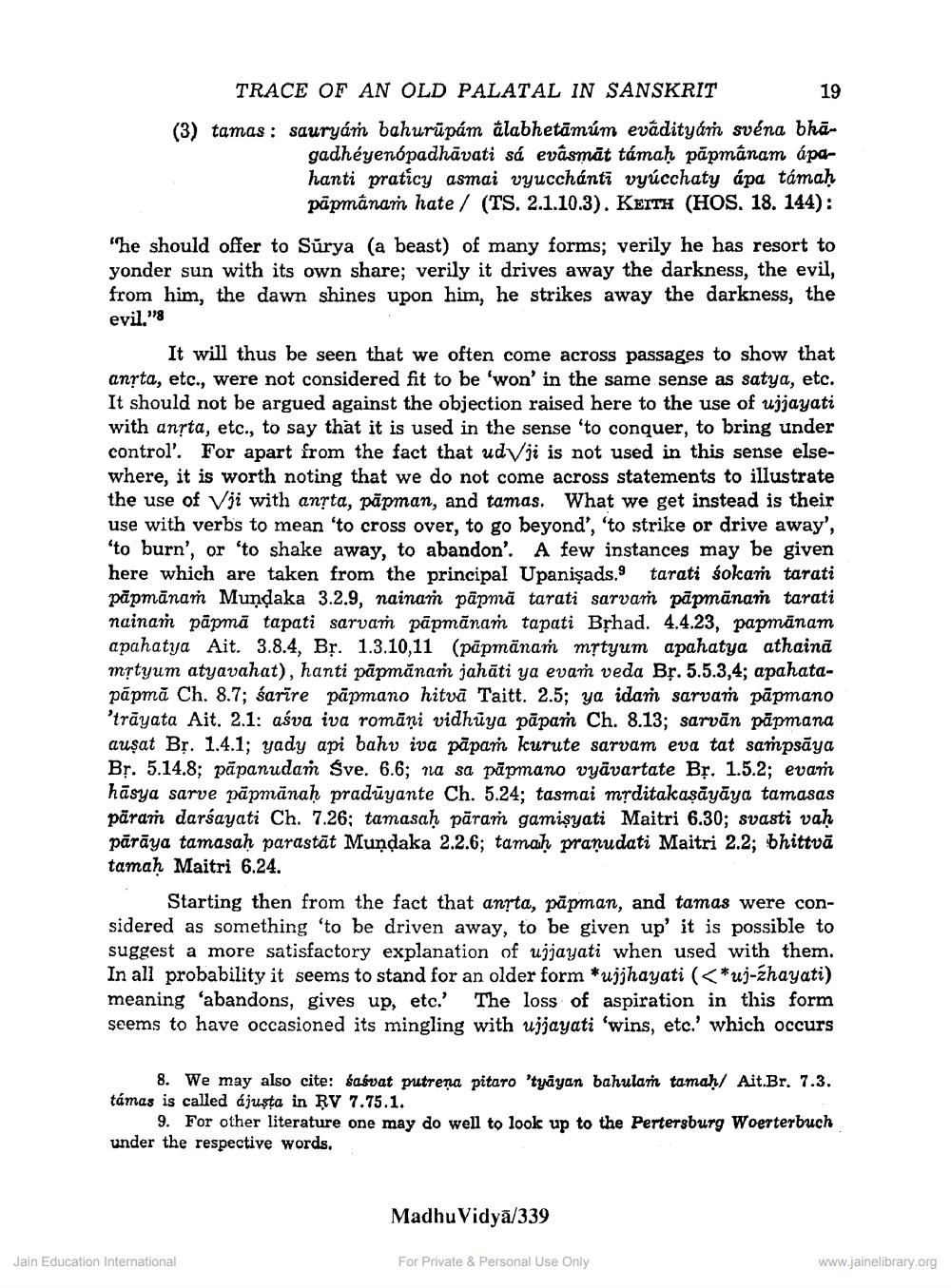________________
TRACE OF AN OLD PALATAL IN SANSKRIT
19
(3) tamas: sauryám bahurūpám alabhetāmúm evadityarn svéna bhā
gadhéyenópadhāvati sá evasmāt támah păpmanam ápahanti praticy asmai vyucchánti vyúcchaty ápa támah pāpmānam hate / (TS. 2.1.10.3). KEITH (HOS. 18. 144):
"he should offer to Surya (a beast) of many forms; verily he has resort to yonder sun with its own share; verily it drives away the darkness, the evil, from him, the dawn shines upon him, he strikes away the darkness, the evil."
It will thus be seen that we often come across passages to show that anyta, etc., were not considered fit to be 'won' in the same sense as satya, etc. It should not be argued against the objection raised here to the use of ujjayati with ansta, etc., to say that it is used in the sense 'to conquer, to bring under control'. For apart from the fact that udvji is not used in this sense elsewhere, it is worth noting that we do not come across statements to illustrate the use of Vji with ansta, pāpman, and tamas. What we get instead is their use with verbs to mean 'to cross over, to go beyond', 'to strike or drive away', 'to burn', or 'to shake away, to abandon'. A few instances may be given here which are taken from the principal Upanişads.9 tarati sokan tarati pāpmānam Mundaka 3.2.9, nainam pāpmă tarati sarvam pāpmānam tarati nainan pāpmā tapati sarvar pāpmānam tapati Brhad. 4.4.23, papmānam apahatya Ait. 3.8.4, Br. 1.3.10,11 (pāpmānam mộtyum apahatya athaina mộtyum atyavahat), hanti pāpmānam jahāti ya evar veda Br. 5.5.3,4; apahatapāpmă Ch. 8.7; śarire păpmano hitvà Taitt. 2.5; ya idam sarvam pāpmano 'trāyata Ait. 2.1: aśva iva romāņi vidhūya pāpam Ch. 8.13; sarvăn pāpmana auşat Br. 1.4.1; yady api bahu iva pāpan kurute sarvam eva tat sampsāya Br. 5.14.8; pāpanudan Sve. 6.6; na sa pāpmano vyävartate Bp. 1.5.2; evam hāsya sarve päpmānaḥ pradūyante Ch. 5.24; tasmai mȚditakaşāyāya tamasas pāram darśayati Ch. 7.26; tamasah paraṁ gamisyati Maitri 6.30; svasti vah pārāya tamasah parastāt Mundaka 2.2.6; tamah pranudati Maitri 2.2; bhittvā tamah Maitri 6.24.
Starting then from the fact that anīta, pāpman, and tamas were considered as something 'to be driven away, to be given up' it is possible to suggest a more satisfactory explanation of ujjayati when used with them. In all probability it seems to stand for an older form *ujjhayati (<*uj-zhayati) meaning 'abandons, gives up, etc. The loss of aspiration in this form seems to have occasioned its mingling with ujjayati 'wins, etc. which occurs
8. We may also cite: sasvat putrena pitaro 'tyayan bahulan tamah/ Ait.Br. 7.3. támas is called ájuşta in RV 7.75.1.
9. For other literature one may do well to look up to the Pertersburg Woerterbuch under the respective words.
Madhu Vidyā/339
Jain Education International
For Private & Personal Use Only
www.jainelibrary.org




